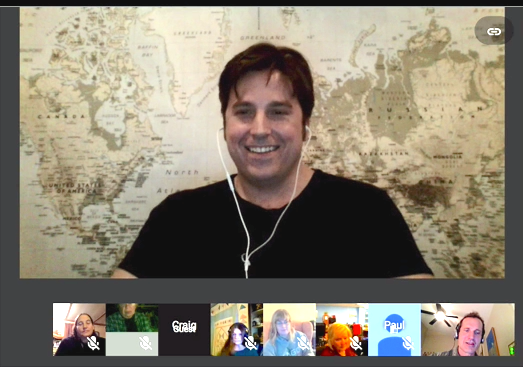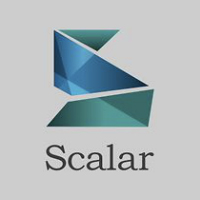 As visiting luminary for the UMaine Digital Curation graduate program’s fall 2015 teleconference, Craig Dietrich challenged its students to consider how culturally sensitive archives and linked data can break the monoculture of one-size-fits-all paradigms for access and publication.
As visiting luminary for the UMaine Digital Curation graduate program’s fall 2015 teleconference, Craig Dietrich challenged its students to consider how culturally sensitive archives and linked data can break the monoculture of one-size-fits-all paradigms for access and publication.
The University of Maine’s own Digital Curation faculty have been busy building a research commons at Dartmouth and giving keynotes in Taipei, Brussels, and Budapest. But they also regularly create opportunities for students to learn from some of the smartest people in the field.
Last semester DIG students spoke with emulation expert Dragan Espenschied; the semester before that, they heard from the Internet Archive’s Jason Scott, renowned champion of crowdsourced preservation. And last month on December 10th they spoke with Scalar and Mukurtu co-creator Craig Dietrich.
 A key member of the team that produces Vectors: A Journal of Culture and Technology in a Dynamic Vernacular, in recent years Dietrich gained renown as Info Design Director for the Alliance for Networking Visual Culture, which produces Scalar, an online publication platform principally designed with creative director Erik Loyer. Unlike prevalent web-based content managers such as WordPress, which Wikipedia claims is used by almost a quarter of the most popular Web sites, Scalar’s foundation uses the Semantic Web, which allows for sharing media seamlessly from archives such as the Internet Archive and Shoah Foundation.
A key member of the team that produces Vectors: A Journal of Culture and Technology in a Dynamic Vernacular, in recent years Dietrich gained renown as Info Design Director for the Alliance for Networking Visual Culture, which produces Scalar, an online publication platform principally designed with creative director Erik Loyer. Unlike prevalent web-based content managers such as WordPress, which Wikipedia claims is used by almost a quarter of the most popular Web sites, Scalar’s foundation uses the Semantic Web, which allows for sharing media seamlessly from archives such as the Internet Archive and Shoah Foundation.
Dietrich was also the first lead developer of the Mukurtu Archive, a media manager conceived by anthropologist Kim Christen based on the Warumungu community Dillybag that supports social practice rather than the legal and economic strictures exemplified by Digital Rights Management. Apart from his work with Aboriginal Australian communities, Dietrich has also contributed to open-source archives designed for Native American protocols.
The conversation touched on everything from digital maps to linked data to the Next Big Thing in metadata. One of the more fascinating topics was LocalContexts.org, which is like a Creative Commons for traditional knowledge. “The Mukurtu team has developed metadata standards to express cultural expectations of native peoples,” Dietrich said. “For example, the ‘Verified’ labels indicate that a group affirms an image or other cultural material does represent their culture.” Students asked how access is controlled; Dietrich responded that “Traditional Knowledge labels are not enforced by legal copyright laws, but encourage voluntary appropriate re-use.”
By way of contrast, Dietrich showed examples of mainstream archives that offer access culture with no regard for context, contending that “the interfaces for archives are not set up for creating narratives.” Fortunately, he gave counterexamples such as Critical Commons, “a YouTube for copyrighted material,” where every movie clip is accompanied by critical analysis, so as to qualify for sharing via fair use. In an impressive application of linked data, meanwhile, Scalar automatically imports metadata for every image, sound clip, and movie from the original archive, thus preserving context.
In the conversation, Dietrich emphasized the importance of metadata in digital curation. Fortunately, UMaine Digital Curation offers an online class in metadata, as well as one in digital preservation, starting this January 19th. You can enroll in a matter of minutes by following the instructions at DigitalCuration.UMaine.edu. You can also see interactive video recordings of Dietrich’s, Espenschied’s, and Scott’s teleconferences hosted by the program.

Patrik Johansson liked this on Facebook.
Kenneth Goldsmith liked this on Facebook.
Per Platou liked this on Facebook.
Gabriela Previdello liked this on Facebook.
Jon Winet liked this on Facebook.
A few things I’m thinking about… MT @stillwaternet How to build a culturally sensitive archive with @CraigDietrich https://t.co/pxXaJKIVMI
RT @craigdietrich: A few things I’m thinking about… MT @stillwaternet How to build a culturally sensitive archive with @CraigDietrich htt…
RT @stillwaternet: No WordPress for the Waramungu: How to build a culturally sensitive archive with @CraigDietrich https://t.co/gBnAujRU81
RT @craigdietrich: A few things I’m thinking about… MT @stillwaternet How to build a culturally sensitive archive with @CraigDietrich htt…
RT @stillwaternet: No WordPress for the Waramungu: How to build a culturally sensitive archive with @CraigDietrich https://t.co/gBnAujRU81
Margo Lukens liked this on Facebook.